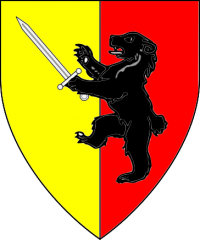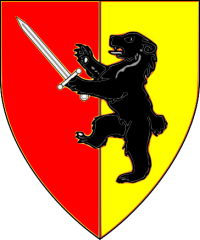Rogned Steingrimovna: Difference between revisions
| Line 35: | Line 35: | ||
Notes on Slavicization: | Notes on Slavicization: | ||
* The long "i" sound in Stein- is a rather alien sound in Russian. | * The long "i" sound in the German pronunciation of Stein- is a rather alien sound in Russian. | ||
* Most of the "Viking Rus" in early Russia were | * "ei" is pronounced "ay" (as in "way") in Old Norse - https://ordstirr.wordpress.com/language/old-norse-pronunciation/ and others. | ||
* In the Byzantine treaties, see below, " | * Most of the "Viking Rus" in early Russia were from Sweden, where "Sten-" is the expected form according to the Viking Answer Lady (see below). The "e" in Old Norse is pronounced like the "e" in "bet" (which is just as it would be pronounced in Russian). | ||
* In the 10th c. Rus-Byzantine treaties, see below, "-stein-" is written in Russian as: sten, or stem. | |||
* Ibid, "Grimr" is converted into simple Grim. That this version is acceptible to Slavic tongues is demonstrated by the Slavic name, Grimislav which is documented in Wickenden. | * Ibid, "Grimr" is converted into simple Grim. That this version is acceptible to Slavic tongues is demonstrated by the Slavic name, Grimislav which is documented in Wickenden. | ||
Conclusion: plausible constructed Slavicized paternal name "Stengrim" leading to patronymic byname Stengrimov -> Stengrimova or Stengrimovna. The Russian "e" is pronounced like "eh" or "yeh", not like "ee". | Conclusion: plausible constructed Slavicized paternal name "Stengrim" leading to patronymic byname Stengrimov -> Stengrimova or Stengrimovna. The Russian "e" is pronounced like "eh" or "yeh", not like "ee" and certainly not like the "i" in "bite" (which is actually a diphthong of ah + ee). | ||
Viking Answer Lady: | Viking Answer Lady: | ||
* Steingrímr - For the first element Stein- see above. For the second element -grímr see above. GB p. 15 s.n. Steingrímr; FJ pp. 346, 349 s.nn. Stein-, -grímr; CV p. xxxiv s.v. "Pet Names"; CV pp. 216, 591 s.v. gríma, steinn; NR s.n. -stæinn, -grímR | * Steingrímr - "For the first element Stein- see above. For the second element -grímr see above. GB p. 15 s.n. Steingrímr; FJ pp. 346, 349 s.nn. Stein-, -grímr; CV p. xxxiv s.v. "Pet Names"; CV pp. 216, 591 s.v. gríma, steinn; NR s.n. -stæinn, -grímR" | ||
** Steinn - Found both as a personal name and as a by-name in Old Danish and '''Old Swedish as Sten''' and in OW.Norse as Steinn. From OW.Norse steinn "stone." As by-name, may reflect place-names in OW.Norse Stein-, -steinn. | ** Steinn - "Found both as a personal name and as a by-name in Old Danish and '''Old Swedish as Sten''' and in OW.Norse as Steinn. From OW.Norse steinn "stone." As by-name, may reflect place-names in OW.Norse Stein-, -steinn... | ||
**Grímr, Grími - Found in Old Danish as Grim (found as a by-name), '''Old Swedish Grim (found as a by-name)''', and OW.Norse Grímr. (Instances in Old Danish and Old Swedish by-names may be derived from the OW.Norse adjective grimmr "grim, cruel, atrocious".) Originally a by-name, related to Old Icelandic gríma, "mask", and may refer to a helm which masks the face, also Grímr was one of the names of the god Óðinn. This name is common in Norway and Iceland through the whole medieval period, and is frequent in Denmark and Sweden. | **Grímr, Grími - "Found in Old Danish as Grim (found as a by-name), '''Old Swedish Grim (found as a by-name)''', and OW.Norse Grímr. (Instances in Old Danish and Old Swedish by-names may be derived from the OW.Norse adjective grimmr "grim, cruel, atrocious".) Originally a by-name, related to Old Icelandic gríma, "mask", and may refer to a helm which masks the face, also Grímr was one of the names of the god Óðinn. This name is common in Norway and Iceland through the whole medieval period, and is frequent in Denmark and Sweden... | ||
====Slavicized Norse names in the Byzantine Treaties:==== | ====Slavicized Norse names in the Byzantine Treaties:==== | ||
Revision as of 20:39, 6 February 2021
Bureaucratic details
Awaiting contact with submitter
- Name: Primary, Alternate, Household or Other?
- Action: New, Resub (kingdom), Resub (laurel), Name Change (retain old as alt), Name Change (release old name), Name Change from Holding Name, Appeal, Other
- Already Registered Name?
- Authenticity desired?
- Allowed Changes: All, Intermediate and Minor, Minor only, No changes
- If changes needed: Language/Culture, Meaning, Sound, Spelling (details)
- Allow Holding Name?
- Gender of Name
- Previous submission history, if any
- Kingdom?
Name Inspiration
Name: Rogned Steingrimovna, Russian persona, 10-13th C, Novgorod.
Given Name
Rogned
Rogneda (f) -- Scandanavian name. Rogneda, daughter of Rogvolod Polotskoi. 980. [Tup 463] Vars: Rogned (daughter of Rogvolod). 980. [Nik IX 39] Rogned' (daughter of Great Prince Mstislav Vladimirovich). 1168. [Tup 463] Rozgneda. c980. [Ste 69] from Wickenden 2nd edition.
Byname/Surname
Steingrimovna
Clearly a lightly Slavicized Scandinavian patronymic byname:
- Scandinavian Steingrimr with Slavic alternate patryonimic ending.
- Standard period patronymic ending is -ova, without the "n" although -ovna is documented and registerable.
- -ovicha is a nice option for northern Rus, Novgorod style.
Notes on Slavicization:
- The long "i" sound in the German pronunciation of Stein- is a rather alien sound in Russian.
- "ei" is pronounced "ay" (as in "way") in Old Norse - https://ordstirr.wordpress.com/language/old-norse-pronunciation/ and others.
- Most of the "Viking Rus" in early Russia were from Sweden, where "Sten-" is the expected form according to the Viking Answer Lady (see below). The "e" in Old Norse is pronounced like the "e" in "bet" (which is just as it would be pronounced in Russian).
- In the 10th c. Rus-Byzantine treaties, see below, "-stein-" is written in Russian as: sten, or stem.
- Ibid, "Grimr" is converted into simple Grim. That this version is acceptible to Slavic tongues is demonstrated by the Slavic name, Grimislav which is documented in Wickenden.
Conclusion: plausible constructed Slavicized paternal name "Stengrim" leading to patronymic byname Stengrimov -> Stengrimova or Stengrimovna. The Russian "e" is pronounced like "eh" or "yeh", not like "ee" and certainly not like the "i" in "bite" (which is actually a diphthong of ah + ee).
Viking Answer Lady:
- Steingrímr - "For the first element Stein- see above. For the second element -grímr see above. GB p. 15 s.n. Steingrímr; FJ pp. 346, 349 s.nn. Stein-, -grímr; CV p. xxxiv s.v. "Pet Names"; CV pp. 216, 591 s.v. gríma, steinn; NR s.n. -stæinn, -grímR"
- Steinn - "Found both as a personal name and as a by-name in Old Danish and Old Swedish as Sten and in OW.Norse as Steinn. From OW.Norse steinn "stone." As by-name, may reflect place-names in OW.Norse Stein-, -steinn...
- Grímr, Grími - "Found in Old Danish as Grim (found as a by-name), Old Swedish Grim (found as a by-name), and OW.Norse Grímr. (Instances in Old Danish and Old Swedish by-names may be derived from the OW.Norse adjective grimmr "grim, cruel, atrocious".) Originally a by-name, related to Old Icelandic gríma, "mask", and may refer to a helm which masks the face, also Grímr was one of the names of the god Óðinn. This name is common in Norway and Iceland through the whole medieval period, and is frequent in Denmark and Sweden...
Slavicized Norse names in the Byzantine Treaties:
907 - Karla, Farlafa, Vermuda, Rulava, Stemida.
| Treaty forms | In nominative case: | Normalized Old West (! - treaty names are likely Old East aka Swedish) Norse per Viking Answer Lady (VAL): |
| Karla, Farlafa, Vermuda, Rulava, Stemida. |
Karl, Farlaf, Vermud, Rulav, Stemid. |
Karl or Karli, Farulfr (vs 911), Vermundr (vs 911), Hrothleifr, Steinvithr. |
Note: All of the above names are also found in the 911 treaty, in the same order (with some extra people added in between)! http://www.vikinganswerlady.com/VarangianNames.shtml
911 Treaty
| Treaty forms | Normalized Old West (!) Norse forms of above per Viking Answer Lady (VAL): | VAL original order | Standardized Norse of above per allempires.net discussion |
| Karly, Inegeld, Farlaf (Farlo per VAL), Veremud, Rulav, Gudy (Goudy per VAL), Ruald (Rouad per VAL), Karn (Kari per VAL, but the Russian is clearly Карн, not Кари), Frelav, Ruar (Roal/Ruar in VAL), Aktevu, Truan, Lidul, Fost, Stemid. |
Karl (Karli?), Ingjaldr, Farleifr (vs 907), Vermothr (vs 907), Hrolleifr, Guthi, Hroaldr, Kari, Freleifr, Hroaldr, omitted Aktevu, omitted Truan, omitted Lidul, omitted Fost, omitted Stemid, added Hroerekr. |
Farlo/Farleifr, Frelav/Freleifr, Goudy/Guthi, Rouad/Hroaldr, Roal/Hroaldr aka Ruar/Hroarr, Rurik/Hroerekr, Rulav/Hrolleifr, Inegeld/Ingjaldr, Kari [sic]/Kari, Karly/Karl, Vermoud/Vermothr. | Karl, Ingjald, Farulf/-leif?, Värmund, Hrolf, Gudi, Hroald, Kari? (mispelled и for н?), Fridleif, Hroald, Angantyr, Thrond, Lidulf, Fasti, ? (Stenvid maybe). |
(Discrepencies between VAL and my version may be differences between Old Russian and modern Russian, for example the old Russian ou is now simply u. There are also multiple manuscripts of the Primary Chronicle.)
944 Treaty
| Treaty forms | Nordiskt runnamnslexikon (The Dictionary of Norse Runic Names) |
| ...Grim Sfir'kov; Prasten Akun... Istr Aminodov; Prasten Bernov; ... Furosten, Bruny, Roal'd, Gunastr, Frasten', ... | ... Grimr, Prasten?, Iostaeinn, ....Prasten?, Biorn, ...Fro/ystaeinn, Brunn, Hroald, Gunn-?, Fro/ystaeinn, ... |
Close (?) names in Wickenden:
- Grimislav (m) -- "decorated glory." Grimislav. 1253. [Mor 64] Vars: Grimizlai. 1247. [Mor 64]
- Stemid (m) -- Stemid. 912. [Mor 186] - clearly from the 911 treaty (old calendar)
Combination
- Documentation for the combination of the names
- Needed if lingual mix, temporal incompatibility, double-given name, etc.
Blazon Information
Blazon Desired: Per pale Or and gules, a bear rampant sable maintaining a sword bendwise argent. "I believe a black border around the edge may need to be added (?)"
- Concern: the argent sword is laying on the Or part of the field, which is no longer allowed with the new rule that maintained charges count for difference. Suggest changing the sword tincture to a color, or swapping the tinctures of the field.
Insta-Boing Checklist
- Registered name - yes
- Rule of Tincture - working on it
- Complexity 8 or less - 6
- Slot-machine - no
- Sword-and-dagger - no
- Offensive/Presumptuous - no
- Unity of Posture/Orientation/Arrangement - okay
Conflict Checking
Name
Device
Per pale Or and gules, a bear rampant sable maintaining a sword bendwise argent.
- Bernhard Brakelman - Per pale Or and gules, a bear rampant sable between three lozenges counterchanged.
- DC for changing # in secondary charge group, DC for changing tincture of secondary charge group (confirmed that maintained/sustained charges are considered secondary charge group unless large enough to be co-primary)
Individually Attested Pattern
- Documentation for any design that violates the rules

